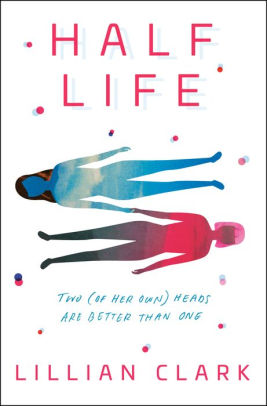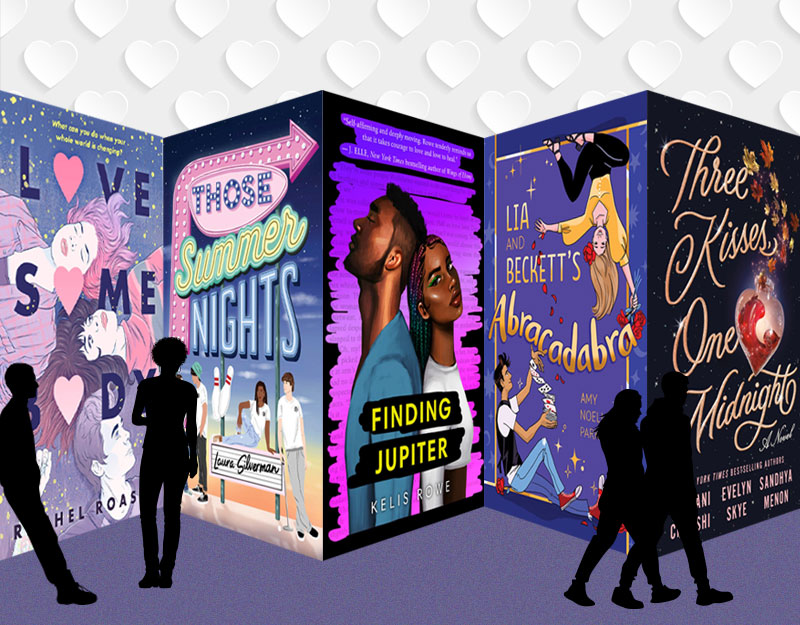A Second Self for Self-Acceptance, a guest post by Lillian Clark

Thank you so much to Teen Librarian Toolbox for hosting this post! My name is Lillian Clark, and I’m the author of Immoral Code and the newly released Half Life, which follows Lucille Harper, an “over-achiever” who signs up to a beta tester for a secretive company finalizing plans to manufacture made-to-order human clones.
Lucille is ambitious. And hard-working. And determined. The problem is that she’s all of those things but…for what? Ever since the first time she went a little above and beyond, she’s been labeled an “overachiever,” a term she takes fundamental issue with. And one she’s not really sure she lives up to. The truth is, she’s been chasing external expectations for so long that she’s not really sure who she actually is, what she actually wants, or why she’s trying so hard.
ADVERTISEMENT
ADVERTISEMENT
As she grows farther apart from her childhood best friend, goes continually unnoticed by her crush, and learns that her seemingly perfect, seemingly happy parents are getting a divorce, she’s approached by Life2, a biotech company offering her the “opportunity of a lifetime.”
Do more. Be more, says their slogan, and Lucille feels it resonate inside her heart.
Because while Lucille turns to near-future science-fiction to “solve” her problems (which, of course, only makes them worse), her worries are ones I think many readers will identify with. They’re certainly ones I identify with. Which is why I wrote Lucille, Lucy, and their plight at all.
At the center of Half Life are a few big questions. Ones like, what does it mean that truth and memory are subjective? And, what constitutes individuality anyway? Plus, how do you accept yourself when you feel like you’re never quite measuring up?
This last one is the driving force behind most of Lucille’s decisions. She feels like no matter how hard she tries, she’s always falling short. While this is personal for Lucille, it’s also something I’ve struggled with myself. And something that, I believe, goes beyond our private expectations for ourselves to those of society.
This is true, likely, for all people, but I think it’s especially so for teen girls. And, unfortunately, ridiculously, those expectations are frequently oxymoronic. As Lucille discusses in the book:
When I think of myself, it’s with a prevailing sense of fear. Fear of inadequacy, of looking foolish, of being too much or too little. Fear of not doing something, anything, everything right.
I resent it. That omnipresent sense of judgment. Feeling like I could do it all “right” yet still be wrong. Be ambitious, but don’t try too hard. Be capable, but not intimidating. Be attentive, but not clingy. Be aloof, but not unattainable. Be feminine, but not too girly. Be “one of the boys,” but not better. Fast, but not faster. Smart, but not smarter. Funny, but not funniest. Be cute. Be sexy. Be fun. Be likeable.
As Lucille and Lucy learn, the moral of the story is that those expectations are, so often, a farce. A trap. A box to keep us stuck inside. Lucille has spent her life pushing herself to achieve an idea of perfection that’s inherently false. She’s defined her sense of success by a finish line that is continuously shifting and is, therefore, impossible to reach. Lucy faces something similar though more distilled. As a clone, what does it mean to exceed expectations? Especially when doing so makes you a threat to the people who created you?
ADVERTISEMENT
ADVERTISEMENT
Rooted in the action and drama of a story about cloning is a question about individuality and inherent worth, the fact that your circumstances and achievements and context don’t determine your value because, as I say in Half Life’s dedication: “You’re already worth it. You’re already enough.”
Meet Lillian Clark

Lillian Clark, a graduate of the University of Wyoming, grew up riding horses, climbing trees, hiking, and going on grand imaginary adventures in the small-town West. She’s worked as a lifeguard, a camp counselor, and a Zamboni driver, but found her eternal love working as a bookseller at an independent bookstore in historic downtown Laramie, WY. Now living with her husband, son, and two giant dogs in the Teton Valley of Idaho, she spends her snowy winters and sunny summers reading almost anything and writing books for teens.
Twitter: @lillianjclark
Instagram: @lillianclarkauthor
About Half Life

An overachiever enrolls in an experimental clone study to prove that two (of her own) heads are better than one in this fast-paced, near-future adventure that’s Black Mirror meets Becky Albertalli.
There aren’t enough hours in the day for Lucille—perfectionist, overachiever—to do everything she has to do, and there certainly aren’t enough hours to hang out with friends, fall in love, get in trouble—all the teenage things she knows she should want to be doing instead of preparing for a flawless future. So when she sees an ad for Life2: Do more. Be more, she’s intrigued.
The company is looking for beta testers to enroll in an experimental clone program, and in the aftermath of a series of disappointments, Lucille is feeling reckless enough to jump in. At first, it’s perfect: her clone, Lucy, is exactly what she needed to make her life manageable and have time for a social life. But it doesn’t take long for Lucy to become more Lucy and less Lucille, and Lucille is forced to stop looking at Lucy as a reflection and start seeing her as a window—a glimpse at someone else living her own life, but better. Lucy does what she really wants to, not what she thinks she should want to, and Lucille is left wondering how much she was even a part of the perfect life she’d constructed for herself. Lucille wanted Lucy to help her relationships with everyone else, but how can she do that without first rectifying her relationship with herself?
ISBN-13: 9780525580508
Publisher: Random House Children’s Books
Publication date: 06/09/2020
Age Range: 12 – 17 Years
Filed under: Uncategorized
About Amanda MacGregor
Amanda MacGregor works in an elementary library, loves dogs, and can be found on Twitter @CiteSomething.
ADVERTISEMENT
ADVERTISEMENT
SLJ Blog Network
2024 Books from Pura Belpré Winners
Passover Postings! Chris Baron, Joshua S. Levy, and Naomi Milliner Discuss On All Other Nights
Winnie-The-Pooh | Review
Parsing Religion in Public Schools
ADVERTISEMENT







